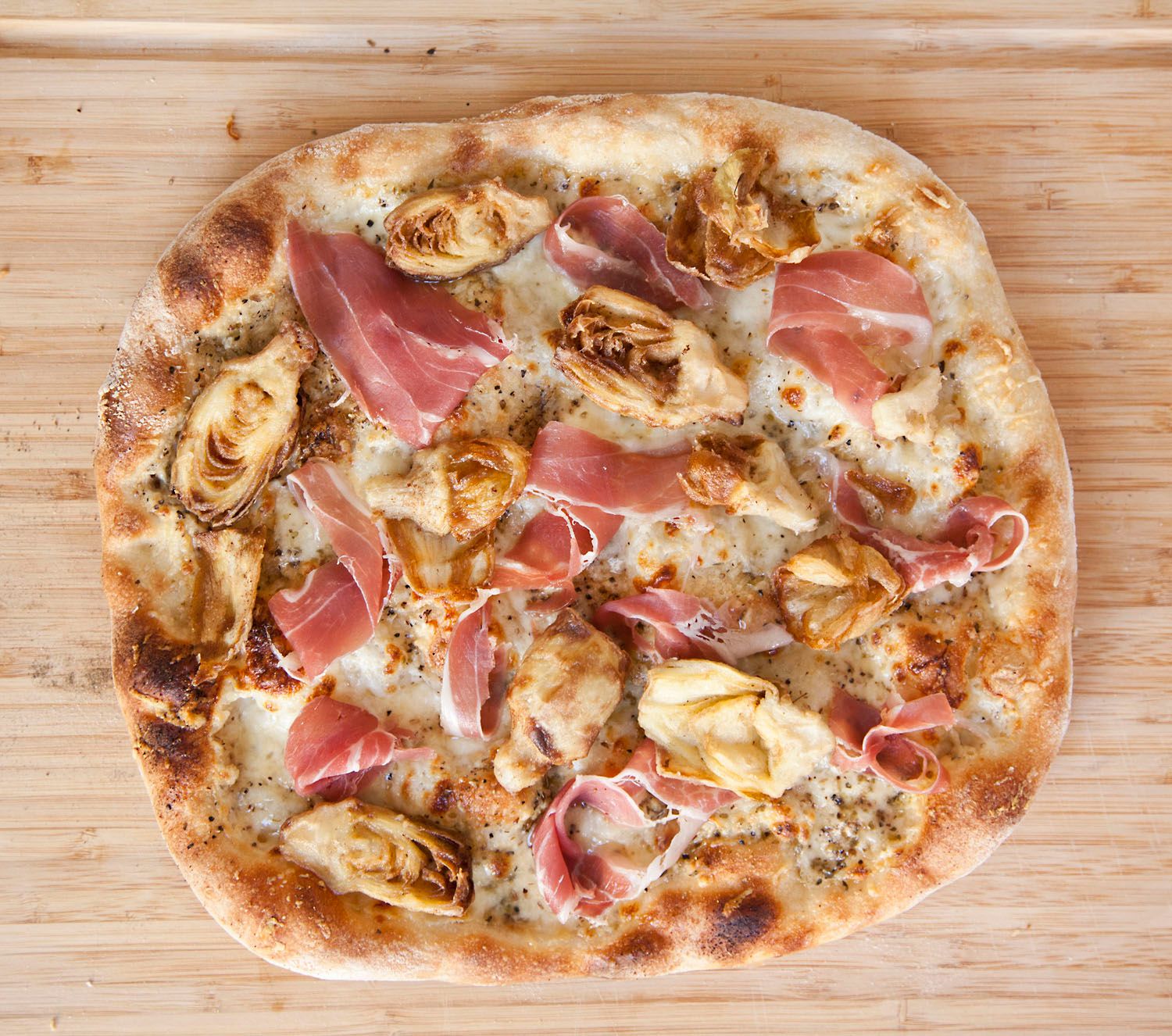Prosciutto and Artichoke Pizza: A Culinary Delight

The irresistible combination of salty prosciutto and earthy artichoke hearts atop a crispy pizza crust has captivated taste buds worldwide. This culinary masterpiece, a testament to the versatility of pizza, transcends geographical boundaries and cultural differences, offering a symphony of flavors that is both familiar and exciting.
History and Origin
While the exact origins of prosciutto and artichoke pizza remain shrouded in culinary mystery, its roots likely trace back to the heart of Italy, where both ingredients are deeply embedded in the culinary landscape. Prosciutto, a dry-cured ham, has a rich history dating back centuries, while artichokes, a Mediterranean staple, have been cultivated for their unique flavor and versatility for millennia.
The combination of these two ingredients on a pizza, likely a product of culinary experimentation and innovation, emerged as a beloved dish in the latter half of the 20th century.
Cultural Significance
Prosciutto and artichoke pizza has transcended its humble beginnings to become a cultural icon, reflecting the evolving culinary landscape of Italy and beyond. It represents a fusion of traditional ingredients and modern culinary techniques, embodying the spirit of innovation and experimentation that defines contemporary cuisine.
This pizza has also become a symbol of shared culinary experiences, bringing people together around a table to savor the flavors of Italy.
Ingredients and Preparation
The key ingredients that elevate prosciutto and artichoke pizza to culinary greatness are the carefully selected components that harmonize to create a symphony of taste and texture.
Dough
The foundation of any great pizza is its dough. A traditional Italian pizza dough is typically made with a simple blend of flour, water, yeast, and olive oil. The dough is kneaded until it becomes smooth and elastic, then allowed to rise in a warm place until it doubles in size.
This process allows the yeast to ferment and develop the characteristic flavor and texture of Italian pizza dough.
Sauce
The sauce plays a crucial role in balancing the flavors of the toppings. A classic tomato sauce, made with fresh tomatoes, garlic, and herbs, is often used. The sauce is simmered until it thickens and develops a rich, complex flavor.
Toppings
The toppings are where the magic truly happens. Prosciutto, thinly sliced and draped across the pizza, provides a salty, savory counterpoint to the earthy artichoke hearts. The artichoke hearts, typically marinated in olive oil and herbs, add a subtle bitterness that complements the salty prosciutto.
Other toppings that complement the classic combination include mozzarella cheese, fresh basil, and a sprinkle of parmesan cheese.
Variations and Innovations
While the classic prosciutto and artichoke pizza remains a beloved staple, culinary creativity has led to a multitude of variations and innovations that expand upon the original recipe.
Table of Variations
| Pizza Name | Unique Feature | Region | Ingredients |
|---|---|---|---|
| Prosciutto and Artichoke with Roasted Garlic | Roasted garlic adds a sweet, caramelized flavor | Italy | Prosciutto, artichoke hearts, roasted garlic, mozzarella cheese, tomato sauce, fresh basil |
| Prosciutto and Artichoke with Caramelized Onions | Caramelized onions add a touch of sweetness | United States | Prosciutto, artichoke hearts, caramelized onions, mozzarella cheese, tomato sauce, fresh rosemary |
| Prosciutto and Artichoke with Goat Cheese | Goat cheese adds a tangy, creamy flavor | France | Prosciutto, artichoke hearts, goat cheese, mozzarella cheese, tomato sauce, fresh thyme |
| Prosciutto and Artichoke with Truffle Oil | Truffle oil adds a luxurious, earthy flavor | Italy | Prosciutto, artichoke hearts, mozzarella cheese, tomato sauce, truffle oil, fresh parsley |
Pairing and Presentation
The art of pairing wine with prosciutto and artichoke pizza is an exercise in enhancing the flavors of both the pizza and the wine.
Table of Wine Pairings
| Pizza Style | Wine Type | Wine Region | Tasting Notes |
|---|---|---|---|
| Classic Prosciutto and Artichoke | Pinot Grigio | Italy | Light-bodied, crisp, with notes of citrus and apple |
| Prosciutto and Artichoke with Roasted Garlic | Sauvignon Blanc | New Zealand | Zesty, with notes of grapefruit and passionfruit |
| Prosciutto and Artichoke with Caramelized Onions | Chardonnay | California | Full-bodied, with notes of oak and vanilla |
| Prosciutto and Artichoke with Goat Cheese | Rosé | Provence, France | Dry, with notes of strawberry and watermelon |
Table of Plating Techniques
| Element | Description | Example | Effect |
|---|---|---|---|
| Pizza Slice | Cut the pizza into even slices | Use a pizza cutter to cut the pizza into 8 slices | Ensures that each slice has a balanced combination of toppings |
| Garnish | Add a touch of color and flavor | Sprinkle fresh basil leaves over the pizza | Adds a burst of freshness and aroma |
| Presentation | Serve the pizza on a rustic wooden board or a ceramic plate | Use a rustic wooden board to create a warm, inviting presentation | Enhances the overall aesthetic appeal of the pizza |
Prosciutto and Artichoke Pizza: A Culinary Experience
:max_bytes(150000):strip_icc()/6977958-ff696944161a4ec6bca874807416808c.jpg)
The sensory experience of eating prosciutto and artichoke pizza is a delightful journey for the taste buds. The salty, savory prosciutto harmonizes with the earthy, slightly bitter artichoke hearts, creating a symphony of flavors that dance on the palate. The crispy crust provides a satisfying crunch, while the melted mozzarella cheese adds a creamy, comforting texture.
